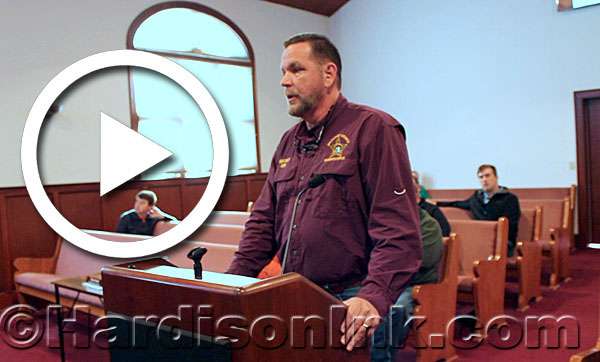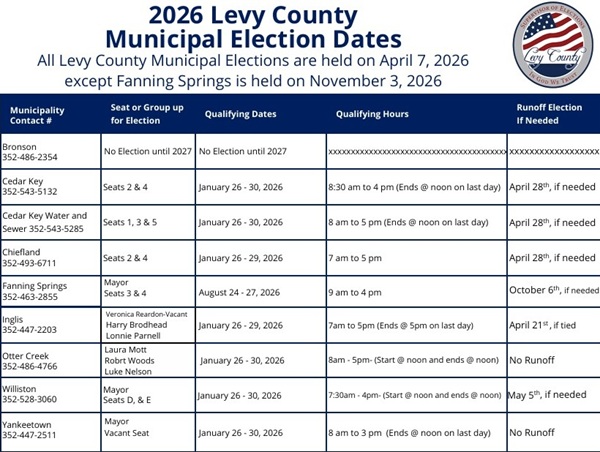

Click HERE to see and hear the most recent performer
of the HardisonInk.com jingle.
Key West Kevin Sings The Jingle.
Construction starts Monday
at Levy County Government Center
Parking and front entrance access detoured
By Jeff M. Hardison © Jan. 24, 2026 at 6:15 a.m.
BRONSON – People who plan to visit the Levy County Government Center in Bronson for business with the Levy County Board of County Commissioners, the Levy County Manager, Levy County Development Services (building/planning), and the Levy County Tax Collector, who normally may park in the front of the building and use that entrance will be redirected starting Monday (Jan. 26) to another area to park and enter the structure, according to information in a press release from the County Commission.
More Below This Ad
The night meeting of the County Commission slated to start at 6 p.m. on Tuesday (Jan. 26) in the auditorium of the main building will be among the first points where this change may be noticed.
People using services of the Levy County Property Appraiser’s Office may have already discovered that office has moved within the campus of the Levy County Government Center, as noted in the Oct. 30, 2025 story and photos that may be seen by clicking HERE.
The Levy County Government Center’s campus is the former campus of Bronson High School. The front entrance is located at 310 School St. in Bronson.
Building renovation activities at the front entrance of the Levy County Government Center will begin Monday, as noted in a press release from Tacia Guthrie, an administrative assistant for the County Commission, and as mentioned at a previous meeting of the County Commission. These improvements are part of Levy County’s ongoing efforts to enhance the safety, accessibility and functionality of county facilities.

During the construction period at the Levy County Government Center, the front parking lot and front entrance will be closed to the public. To ensure continued access by the public of county services at that location, all visitors must utilize the east parking lot and the east entrance when visiting the facility.
Clearly marked and appropriate signage will be installed and maintained to direct the public to the designated parking and entrance areas during this construction period.
The five elected leaders of the Levy County Commission recognize the construction activities may cause temporary inconvenience, Guthrie noted, and they all appreciate the public’s patience and cooperation throughout the duration of this project. Levy County remains committed to maintaining a safe environment for residents, visitors, employees and contractors, while making every reasonable effort to minimize disruptions to daily operations, Guthrie added in the press release.
For more information, please call the Levy County Commission’s office at 352-486-5218.
More felons to visit Trenton
City police force dwindles
GCSO near full strength
Chief deputy retires
Soon after the start of their one meeting in January, the Gilchrist County Commission (from left) Vice Chairman Bill Martin, Chairman Darrell Smith, Commissioner Tommy Langford and Commissioner Sharon Langford prepare for their duties.
Story, Photos and Video By Jeff M. Hardison © Jan. 17, 2026 at 7:45 a.m.
All Copyrights Protected By Federal Civil Law
Do Not Copy and Paste to Social Media or Elsewhere
TRENTON – As felonious probationers and parolees switch from mandatorily checking in at Chiefland to going to the future office in Trenton as of March, it means the level of convicted felons visiting Trenton will increase, Gilchrist County Sheriff Bobby Schultz told county commissioners Thursday evening (Jan. 16).
Schultz, who is the high sheriff of Gilchrist County, had more than just that update -- and he shared finer points about all of the news for the County Commission that Thursday.
It was the singular scheduled meeting of the Gilchrist County Board of County Commissioners for January, when normally there are two, usually on the first and third Mondays starting at 4 p.m.
The first Monday of 2026 was Jan. 5. The third Monday of 2026 is Jan. 19, which is a federal holiday to honor slain civil rights leader Dr. Martin Luther King Jr. (Jan. 15, 1929 - April 4, 1968). Hence, the commission advertised the special meeting of Jan. 15, and it kept that promise to the public -- as the meeting started promptly at 4 p.m. on that Thursday.
Clerk of the Court Todd Newton looks at his computer screen during the meeting.
County Administrator Bobby Crosby and County Attorney David Miller ‘Duke’ Lang Jr. look toward the County Commission.
Gilchrist County Sheriff Bobby Schultz prepares to tell the County Commission information regarding the Sheriff’s Office, as well as the municipal law enforcement agency in Trenton and the state agency regulating probationers and parolees for this part of Florida.

Gilchrist County Sheriff Bobby Schultz announces that former Chief Deputy Robert Willis retired after 25 years. The sheriff gave details about that. He spoke about Trenton downsizing its former police department. The sheriff announced, too, that the office for the Florida Probation and Parole felons from part of Alachua County, as well as all of Dixie County, Gilchrist County and Levy County is moving from Chiefland to Trenton in March. He spoke about this and more during the special meeting of the Gilchrist County Commission on Jan. 15 -- the only meeting that month for that County Commission. Click on the PHOTO to see and hear the video.
Video by Jeff M. Hardison -- All Rights Reserved
Chief Deputy Retires
Schultz announced that former Chief Deputy Robert Willis, who was also known as Gilchrist County Undersheriff Willis, retired after 25 years of service to the people of Florida.
Willis is an attorney. He rejoined the Eighth Judicial Circuit State Attorney’s Office as an assistant state attorney in December of 2006 while State Attorney William Cervone served in that elected post for 20 years, from his election in 2000 until his retirement on Dec. 30, 2020. Cervone had previously worked in the State Attorney’s Office before being elected and Cervone also served as an assistant state attorney under State Attorney Rod Smith after returning to prosecution in 1992.
As for Willis, he joined the GCSO team in 1997 as a road deputy, beginning his law enforcement career there under former Gilchrist County Sheriff David P. Turner, and later returned in 2019 as the undersheriff before retiring in December of 2025.
Sheriff Schultz said Willis has now entered private practice as an attorney. During Willis’ tenure as chief deputy, Schultz said, he did a great job.
Willis helped put the GCSO in a good position fiscally as well as operationally, and although he is moving into a different aspect of his professional career, the GCSO is not going to be significantly impacted with this reduction in administrative force, Schultz intimated.
That vacant post will not be filled, according to Sheriff Schultz’s current plan, he said, although he may revise that, too, by reestablishing the post if needed.
Instead, the sheriff said he plans to use what would have been Willis’ salary to fund an investigator’s position. As for the rest of what would have been his chief deputy’s salary, the sheriff said he may purchase some things he could not otherwise afford as well from that reduced expense.
As for staffing the GCSO this year, Schultz said he has completely filled the posts for law enforcement officers. In the dispatch section of his office, the sheriff said there are one or two seats open, although he believes staffing for those posts is readily available. In regard to corrections, or the jail staff, he sees a couple of openings – while also foreseeing filling those vacancies very soon as well.
The sheriff mentioned that at the conclusion of fiscal years when he has money to return to the County Commission’s coffers, those funds usually come from him not filling vacant positions in the GCSO. Right now, the sheriff said, the GCSO is right on track with funding for this fiscal year, according to the GCSO’s Chief Financial Officer Jeannine Pfannschmidt.
Gilchrist County Commission Director of Finance Richard Romans and Assistant Director of Finance Tonya Howell serve under Gilchrist County Clerk and Comptroller Todd Newton, and the County Commission funds the GCSO, since the Sheriff’s Office is not a taxing authority.
After speaking about the retirement of Undersheriff Willis, staffing and funding, Sheriff Schultz spoke about the City Council of Trenton downsizing its police department.
The sheriff announced, too, that the office for the Florida Probation and Parole felons from part of Alachua County, as well as all of Dixie County, Gilchrist County and Levy County is moving from Chiefland to Trenton in March.
Trenton Police Force Reduction
Schultz said he believes that as of Jan 14, the city does not have an active municipal police force anymore.
The city is advertising for a new police chief, he said, and while the City Council did not eliminate that law enforcement agency, it did downsize it, Schultz said.
When city leaders asked Schultz what impact this will have on the GCSO, he told him that he did not know at that minute; nonetheless, the sheriff said his office will continue to provide law enforcement for Trenton, just as it does for the Town of Bell and the unincorporated part of Gilchrist County.
“No more, no less,” than in Bell or other parts of Gilchrist County, the sheriff added in regard to the level of law enforcement coverage now in Trenton by the GCSO.
In Levy County, after the Inglis Police Department was abolished, that City Commission voted to pay the Levy County Board of County Commissioners to fund the Levy County Sheriff’s Office to provide more service than the LCSO provides in the unincorporated part of that county.
The sheriff said he believes that Gilchrist County is one of the safest counties in Florida and in the United States of America, and that is because of the work of everyone at the GCSO serving the residents and visitors of this county – One Team, One Mission.
Visiting Felons
The State of Florida Probation and Parole, which is formerly known as the Office of Community Corrections, a division of the Florida Department of Corrections (FDOC), is moving its office from Chiefland to Trenton in March, Schultz said.
The staff in this FDOC office oversee felons on probation or parole from part of Alachua County, and all of Levy, Gilchrist and Dixie counties, he said.
FDOC Secretary Ricky D. Dixon is the lead of the department for the whole state. Dixon was appointed by Gov. Ron DeSantis in November of 2021. Dixon assumed responsibility for the operation of the third-largest state prison system in the United States. He is responsible for the care, custody and control of more than 89,000 inmates and more than 144,000 offenders on community supervision. He oversees nearly 24,000 staff members, according to records.
Dixon began his career in 1996 as a Correctional Officer at Lancaster Correctional Institution. He was promoted through the security ranks and was appointed Correctional Officer Colonel of Florida State Prison, according to records.
The Gilchrist County Jail will be used to house some of these offenders for some time when they fail to abide by the rules set for them by their probation or parole status, Schultz said, and arrest warrants are served on them.
That will be taxing on the two transport officers at the GCSO, he said.
“We’re going to try to get them out of our jail as fast as we can,” he added. “But some of those things, it takes a little while.”
County Commission Vice Chairman Bill Martin asked if the state is funding this. The sheriff said “No.”
“Why did they choose us?” Commissioner Sharon Langford asked.
“I didn’t ask those questions,” Schultz said. “And it was a done deal before” he was told about the move that is going to happen.
The GCSO will have responsibility for the care, custody and control of those visiting inmates while they are in the Gilchrist County Jail, Schultz said. That includes food, medical costs and other expenses.
The sheriff said that after six or seven months he will have a better gauge of the financial impact this move by the state will have on this county.
On a slow month in that office in Chiefland, Sheriff Schultz said he was told there are 10 to 20 felons who violate their probation or parole conditions and they must be incarcerated. After that, the suspected violator goes before a judge who rules on what that violation means for the defendants’ lives – prison, extended parole or probation, etc.
Commissioner Sharon Langford asked if the elected officials representing Gilchrist County in the Florida Senate and Florida House of Representatives can have any sway on where those felons are overseen during their parole and probation periods.
The sheriff said he was told to expect the change to be in March. He presumes the state chose the facility where it found the least cost for rental of office space as far as the deciding factor on where that office exists.
Perhaps the Chiefland office was inadequate to meet the state’s needs, or maybe the lease fee was too steep, the sheriff said, in comparison with what the FDOC found in Trenton.
Or maybe this part of the FDOC wanted to be more central to Alachua County -- where one of the district offices is located in Gainesville, he surmised.
The sheriff said he does not think this is going to be a huge deal. Schultz added, however, that just like with the reduction of the municipal police force in Trenton, he cannot know the impact on the county or the city in the future. As things unfold, he assures the County Commission members that he and the GCSO will respond accordingly. There may be a need for more funding from the County Commission.
Candidate qualifying for Levy County’s
municipalities are mostly this month
Information and Graphic Provided
By Levy County Supervisor Of Elections Tammy Jones
Provided Jan. 13, 2026
Published Jan. 14, 2026 at 4:15 p.m.
BRONSON -- Candidate qualifying information for the 2026 municipal elections for most Levy County municipalities shows those cities and towns will conduct candidate qualifying this month January 2026.
This is in preparation for the upcoming Municipal Election scheduled for April 7, 2026. Candidate qualifying is a critical step for individuals interested in running for office in their respective municipalities. During this period, candidates
must submit all required paperwork to their local city or town hall to secure a place on the ballot.
The following municipalities will qualify from Monday, Jan. 26, through Friday, Jan. 30:
• City of Cedar Key
• Cedar Key Water & Sewer District
• Town of Otter Creek
• City of Williston
• Town of Yankeetown
The following municipalities will begin on Monday, Jan. 26, but will close qualifying one day earlier, on Thursday, Jan. 29:
• City of Chiefland
• Town of Inglis
Other Municipalities
• Fanning Springs: Qualifying will be held the week of Aug. 24, due to a later election.
• Town of Bronson: No elections until 2027.
Under Florida law, candidates may prequalify by submitting qualifying documents up to two weeks before the official qualifying period begins. Please note that each municipality has different qualifying days, hours, and seats available. Refer to the chart below for details, including:
• Qualifying Dates
• Qualifying Hours
• Seats Open
• Contact Information
For questions or additional information, contact the Levy County Supervisor of Elections Office at 352-486-5163 or email tammy@votelevy.gov.

Dixie County votes to force
commercial garbage haulers to pay
‘Mom and pop’ ventures included
Dixie County Commission Vice Chairman Jamie Storey speaks about the need to collect tipping fees of $50 per ton from all garbage haulers, except Dixie County residents that pay an annual assessment, for garbage hauled to the main solid waste transfer site. This fee will generate hundreds of thousands of dollars at the current rate of garbage being delivered to the solid waste transfer site. This includes ‘mom and pop’ garbage haulers with trailers.
Story and Photos By Jeff M. Hardison © Jan. 9, 2026 at 7:30 p.m.
All Copyrights Protected By Federal Civil Law
Do Not Copy and Paste to Social Media or Elsewhere
CROSS CITY – A lengthy and laborious discussion about an ordinance from 1991 in Dixie County, which including verbal input via telephone by a person named “Mary” on Jan. 8, resulted in a 4-0 vote by the Dixie County Board of County Commissioners to force people and companies that are paid to deliver garbage to the solid waste transfer stations in Dixie County to pay the tipping fee of $50 per ton, with $50 being the minimum fee.
The discussion began when Dixie County Manager John Jenkins said that a review of that 1991 ordinance by Dixie County Attorney Chana Watson showed those fees are to be paid.
Dixie County Commission Vice Chairman Jamie Storey made a motion for Waste Pro -- and all other haulers who collect money to transport residential garbage there -- to pay the $50-per-ton fee for garbage that is brought to the dump site. That motion was seconded by County Commissioner Daniel Wood III.
The Storey-Wood motion passed 4-0 with Commission Chairman Mark Hatch and Commissioner David Osteen being the other two gentlemen to vote in favor of it with Storey and Wood. Dixie County Commissioner Jody Stephenson was absent due to a significant health problem that kept him away from the meeting that day.
The discussion went sideways with some conversation about the $18 monthly fee for Cross City utility customers. Hatch intimated his belief that the annual special assessment for all county residents should be refunded to any municipal utility customers who pay for garbage service, because those people pay the Cross City municipal government, or other municipal government entities. People in municipalities, such as the eight incorporated towns and cities in Levy County enjoy benefits in addition to those of people who live in unincorporated parts of Levy County. The same is true in all Florida counties and cities.
The people who live within a municipality’s limits, nonetheless, are still within the county where that town, city or other geo-political subdivision exists. If the special assessment is for the funding of the solid waste transfer sites and not for the transport of garbage from homes to those sites, then a city that imposes a utility fee for the transportation services in addition to the service provided by the county government for all of the people within the county, then that does not exclude those city residents from paying that special assessment to the county.
Still, the county government leaders can opt to give municipal residents a benefit not enjoyed by all other county residents. That may be questioned by people joining in a class action against the county, and a judge or jury might have to decide whether that special benefit provided to the city residents is fair.
The proverbial bottom line for all people in Dixie County who use the services of Waste Pro, or those who pay “mom and pop operators” for their unlicensed, uninsured trash transport service to collect residential garbage will now pay the tipping fee in Dixie County – as of Jan. 8 -- via increased prices from those services providers to let them remain in business in this market.
Waste Pro and other haulers are bound to increase fees to offset the new cost they will see from Dixie County mandating tipping fees to be paid.
In Dixie County, residential property owners pay a special assessment, which is part of the funding for the solid waste transfer sites – not to cover the cost of transporting garbage.
For the residential customers who pay Waste Pro to collect garbage, as Vice Chairman Storey said he does, there is no rebate on the special assessment he pays to the county annually for solid waste.
Apparently, Waste Pro had not been paying a tipping fee on garbage collected from Dixie County’s residential customers when that household debris was deposited at the solid waste transfer sites in Dixie County.
Dixie County hauls that type of garbage to a regional landfill site rather than establishing a new landfill. The old Dixie County Landfill has been decommissioned.
Some people at the meeting Thursday seemed to think Cross City government leaders would object to the County Commission voting to force tipping fees to be paid by Waste Pro and others who haul residential garbage -- because it is bound to cause prices for that service to increase. This action was listed on the agenda only as matters under the county administrator. The agenda for Dixie County Commission is not as specific as the agendas published in Levy County and Gilchrist County for the public in those counties.
John Locklear, a professional engineer, tells Dixie County leaders how commercial and residential garbage is defined differently.
John Locklear, who has 32 years of experience advising interests on matters related to solid waste management, helped County Commissioners understand that residential garbage and commercial garbage are defined by the source that creates it. For instance, debris generated from a family in a house is different from debris generated at a commercial interest, such as a business or manufacturing site.
Commissioners decided that when Waste Pro collects garbage from a residence, it becomes the property of Waste Pro, which is a commercial interest. Hence, the County Commission feels Waste Pro must pay the per-ton fee for that “commercial” garbage it takes to the solid waste transfer site in Dixie County, even though it was collected from residential garbage sources.
Other Actions
In other actions at the Jan. 8 meeting, the County Commission:
Greg Bailey of North Florida Professional Services speaks to the County Commission on Jan. 8.
● Heard updated information from Greg Bailey of North Florida Professional Services about projects NFPS is involved with in Dixie County, including construction of fire stations and roadwork, as well as the Horseshoe Beach Working Waterfront Project, and the three approved RESTORE Act projects -- the Jena Highway Bridge replacement, the Suwannee community’s seawall, and for work on Shired Island Park Beach.
● Heard from John Locklear about projects he is involved with in Dixie County, including revising the purchasing policy manual; and updates on the dredging projects off of Horseshoe Beach and Shired Island.
● Heard Code Enforcement Officer Steve Fremen say the next Code Enforcement Hearing is set to be in the Dixie County Courthouse before a judge on Feb. 5 at 1 p.m.
Dixie County Road Department Director Michael Gainey is granted permission by a 4-0 vote to advertise for crushed rock that is needed for roadwork.
● Agreed by a 4-0 vote to approve the reduced number of CareerSource Board of Directors members required for a quorum to conduct business. Dixie County is in CareerSource North Central Florida (Region 26), along with the five other counties -- Alachua, Bradford, Columbia, Gilchrist, and Union Counties, providing career services, job training and business support for the area. The minimal number of members present was reduced from six to four. Levy County is in the Citrus Levy Marion CareerSource region, which include three counties – Citrus, Levy and Marion.
● Heard an update from Dixie County Attorney Chana Watson regarding a lawsuit against the county in regard to a traffic accident.
196th Performance

Key West Kevin performs the HardisonInk.com jingle at the Driftwood Bar & Grill on Jan. 24. The bar and grill was a cornerstone for the 2026 Tour of the Towns, which was organized by the Withlacoochee Gulf Area Chamber of Commerce to help business interests in Inglis and Yankeetown. This was filmed on Saturday (Jan. 24, 2026). Jeff M. Hardison asks people to sing the jingle, and some of them agree to sing it. (Thanks people!) CLICK ON THE PICTURE ABOVE TO SEE AND HEAR THE VIDEO ON YouTube.com. The very first person to sing the jingle was Danesh “Danny” Patel of Danny’s Food Mart in Chiefland in March of 2013. HardisonInk.com started as a daily news website on Feb. 1, 2011.
Photo and Video by Jeff M. Hardison © Jan. 24, 2026 at 7:30 p.m.
All Rights Reserved - Do Not Copy And Paste Anywhere Else




























